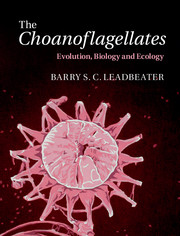Crossref Citations
This Book has been
cited by the following publications. This list is generated based on data provided by Crossref.
ESA
2015.
Books and Monographs Received.
Ecology,
Vol. 96,
Issue. 9,
p.
2573.
Riisgård, Hans Ulrik
Kumala, Lars
and
Charitonidou, Katerina
2016.
Using the F/R-ratio for an evaluation of the ability of the demosponge Halichondria panicea to nourish solely on phytoplankton versus free-living bacteria in the sea.
Marine Biology Research,
Vol. 12,
Issue. 9,
p.
907.
Karpov, Sergey A.
2016.
Flagellar apparatus structure of choanoflagellates.
Cilia,
Vol. 5,
Issue. 1,
Marron, Alan O.
Chappell, Helen
Ratcliffe, Sarah
and
Goldstein, Raymond E.
2016.
A model for the effects of germanium on silica biomineralization in choanoflagellates.
Journal of The Royal Society Interface,
Vol. 13,
Issue. 122,
p.
20160485.
Richter, Daniel J.
and
Nitsche, Frank
2016.
Handbook of the Protists.
p.
1.
Marron, Alan O.
Ratcliffe, Sarah
Wheeler, Glen L.
Goldstein, Raymond E.
King, Nicole
Not, Fabrice
de Vargas, Colomban
and
Richter, Daniel J.
2016.
The Evolution of Silicon Transport in Eukaryotes.
Molecular Biology and Evolution,
Vol. 33,
Issue. 12,
p.
3226.
Kirkegaard, Julius B.
and
Goldstein, Raymond E.
2016.
Filter-feeding, near-field flows, and the morphologies of colonial choanoflagellates.
Physical Review E,
Vol. 94,
Issue. 5,
Anderson, Douglas P
Whitney, Dustin S
Hanson-Smith, Victor
Woznica, Arielle
Campodonico-Burnett, William
Volkman, Brian F
King, Nicole
Thornton, Joseph W
and
Prehoda, Kenneth E
2016.
Evolution of an ancient protein function involved in organized multicellularity in animals.
eLife,
Vol. 5,
Issue. ,
Varoqueaux, Frederique
and
Fasshauer, Dirk
2017.
Getting Nervous: An Evolutionary Overhaul for Communication.
Annual Review of Genetics,
Vol. 51,
Issue. 1,
p.
455.
Sebé-Pedrós, Arnau
Degnan, Bernard M.
and
Ruiz-Trillo, Iñaki
2017.
The origin of Metazoa: a unicellular perspective.
Nature Reviews Genetics,
Vol. 18,
Issue. 8,
p.
498.
Mills, D. B.
and
Canfield, D. E.
2017.
A trophic framework for animal origins.
Geobiology,
Vol. 15,
Issue. 2,
p.
197.
Koens, Lyndon
and
Lauga, Eric
2017.
Analytical solutions to slender-ribbon theory.
Physical Review Fluids,
Vol. 2,
Issue. 8,
Miño, Gastón L.
Koehl, M. A. R.
King, Nicole
and
Stocker, Roman
2017.
Finding patches in a heterogeneous aquatic environment: pH‐taxis by the dispersal stage of choanoflagellates.
Limnology and Oceanography Letters,
Vol. 2,
Issue. 2,
p.
37.
Richter, Daniel J.
and
Nitsche, Frank
2017.
Handbook of the Protists.
p.
1479.
Nielsen, Lasse Tor
Asadzadeh, Seyed Saeed
Dölger, Julia
Walther, Jens H.
Kiørboe, Thomas
and
Andersen, Anders
2017.
Hydrodynamics of microbial filter feeding.
Proceedings of the National Academy of Sciences,
Vol. 114,
Issue. 35,
p.
9373.
Cavalier-Smith, Thomas
2017.
Origin of animal multicellularity: precursors, causes, consequences—the choanoflagellate/sponge transition, neurogenesis and the Cambrian explosion.
Philosophical Transactions of the Royal Society B: Biological Sciences,
Vol. 372,
Issue. 1713,
p.
20150476.
Lyons, Timothy W.
Droser, Mary L.
Lau, Kimberly V.
Porter, Susannah M.
Mills, Daniel B.
Francis, Warren R.
and
Canfield, Donald E.
2018.
Animal origins and the Tonian Earth system.
Emerging Topics in Life Sciences,
Vol. 2,
Issue. 2,
p.
289.
Booth, David S.
Szmidt-Middleton, Heather
King, Nicole
and
Kellogg, Doug
2018.
Transfection of choanoflagellates illuminates their cell biology and the ancestry of animal septins.
Molecular Biology of the Cell,
Vol. 29,
Issue. 25,
p.
3026.
Hendry, Katharine R.
Marron, Alan O.
Vincent, Flora
Conley, Daniel J.
Gehlen, Marion
Ibarbalz, Federico M.
Quéguiner, Bernard
and
Bowler, Chris
2018.
Competition between Silicifiers and Non-silicifiers in the Past and Present Ocean and Its Evolutionary Impacts.
Frontiers in Marine Science,
Vol. 5,
Issue. ,
Wetzel, Laura A
Levin, Tera C
Hulett, Ryan E
Chan, Daniel
King, Grant A
Aldayafleh, Reef
Booth, David S
Sigg, Monika Abedin
and
King, Nicole
2018.
Predicted glycosyltransferases promote development and prevent spurious cell clumping in the choanoflagellate S. rosetta.
eLife,
Vol. 7,
Issue. ,





